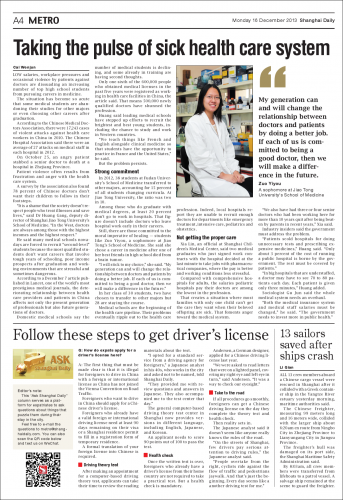LOW salaries, workplace pressures and occasional violence by
patients against doctors are dissuading an increasing number of top
high school students from pursuing careers in medicine.
The situation has become so acute that some
medical students are aban-doning their studies for other majors or
even choosing other careers after graduation.
According to the Chinese Medical Doctors
Association, there were 17,243 cases of violent attacks against
health care workers in China in 2010. The Chinese Hospital
Association said there were an average of 27 attacks on medical
staff in each hospital in 2012.
On October 25, an angry patient stabbed a senior
doctor to death at a hospital in Zhejiang Province.
Patient violence often results from frustration
and anger with the health care system.
A survey by the association also found 78
percent of Chinese doctors don‘t want their children to follow in
their footsteps.
“It is a shame that the society doesn’t re-spect
people who treat illnesses and save lives,” said Dr Huang Gang,
deputy director of Shanghai Jiao Tong University‘s School of
Medicine. “In the West, doctors are always among those with the
highest incomes and the highest respect.”
He said many medical schools nowadays are forced
to recruit “second-level”students because the most qualified
students don’t want careers that involve tough years of schooling,
poor income prospects after graduation and working environments
that are stressful and sometimes dangerous.
According to a December 7 article published in
Lancet, one of the world‘s most prestigious medical journals, the
deteriorating relationship between health care providers and
patients in China affects not only the present generation of
professionals but also future generations of doctors.
Domestic medical schools say the number of
medical students is declining, and some already in training are
having second thoughts.
Only one-sixth of the 600,000 people who
obtained medical licenses in the past five years were registered as
working in health care facilities in China, the article said. That
means 500,000 newlyqualified doctors have shunned the profession.
Huang said leading medical schools have stepped
up efforts to recruit the brightest and best young students,
including the chance to study and workin Western countries.
“We teach things like French andEnglish
alongside clinical medicine sothat students have the opportunity
topractice in France and the United States,”he said.
But the problem persists.
Strong commitment
In 2012, 38 students at Fudan University’s
School of Medicine transferred to other majors, accounting for 15
percentof all students changing curricula. At Jiao Tong University,
the ratio was two in 10.
Among those who do graduate with medical
degrees, at least 20 percent don‘t go to work in hospitals. That
figure doesn’t include doctors who leave hospital work early in
their careers.
Still, there are those committed to themoral
imperative of healing students like Zuo Yiyou, a sophomore at
JiaoTong‘s School of Medicine. She said shechose a career in
medicine after one of her best friends in high school died froma
brain tumor.
“I will stick to my choice,” she said. “My
generation can and will change the relationship between doctors and
patients bydoing a better job. If each of us is committed to being
a good doctor, then we will make a difference in the future.”
In her class of 30 students, two have chosen to
transfer to other majors but 28 are staying the course.Medical
schools are the beginning of the health care pipeline. Their
problems eventually ripple out to the health care profession. Indeed, local hospitals report they are unable to
recruit enough doctors for departments like emergency treatment,
intensive care, pediatrics and obstetrics.
Not getting the proper care
Xia Lin, an official at Shanghai Children‘s Medical Center, said
two medical graduates who just signed work contracts with the
hospital decided at the last minute to take jobs with
pharmaceutical companies, where the pay is better and working
conditions less stressful.
Compared with comprehensive hospitals for
adults, the salaries pediatric hospitals pay their doctors are
among the lowest in the profession.
That creates a situation where most families
with only one child can’t get the care they want when their beloved
offspring are sick. That foments anger toward the medical system.
“We also have had three or four seniordoctors who had
been working here for more than 10 years quit after being beaten by
parents in recent years,” Xia said.
Industry insiders said the government must
address the problem.
“Patients scold hospitals for
doing unnecessary tests and prescribing expensive medicines,”
Huang said. “Only about 3 percent of the cost of running a public
hospital is borne by the government. The rest must be covered by
patients.”
“In big hospitals that are understaffed,a doctor may
have to see 70 to 80 patients each day. Each patient is given only
three minutes,” Huang added.
Sociologist Gu Jun said the whole medical
system needs an overhaul.
“Both the medical insurance systemand medical staff
salaries must bechanged,” he said. “The government needs to invest
more in public health.

